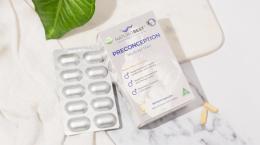Strategies to Relieve Common Digestive Complaints

The digestive system is vital for total-body health. Besides its main role of extracting nutrients from food to be turned into energy for movement, growth and repair, the digestive system is also instrumental in maintaining the health of other organ systems, such as the brain, immune system, skin, heart and thyroid for which a wealth of research strongly supports.
Unfortunately for many people their digestive health is far from ideal. Statistics show at least 50% of Australian adults experience a wide range of distressing gut symptoms[1]. Why are gut issues so common these days? Read below to find out!
Disclaimer:Always speak with your doctor before taking any action regarding your health. Supplements have a wide range of potential effects and it's important to ensure that they are right for you. This article is not intended to diagnose, treat, or cure any disease. This post is based on general knowledge and does not provide specific medical advice. This article is for informational purposes only and in no way attempts to diagnose a specific medical problem. You should always consult your healthcare provider before commencing any supplement regime particularly if pregnant, breastfeeding or on any medications. |
Understanding the digestive system
It’s fundamentally made up of the long gastrointestinal tract, a series of hollow organs that if unspooled, would span 9 meters which is equivalent to the length of a male killer whale!
The digestive system can can be subdivided into the:
- Upper digestive tract: including the mouth, stomach and small intestine, which aims to mechanically and chemically break down our food. Adequate stomach acid and digestive enzymes are necessary for healthy upper digestion.
- Lower digestive tract: of which the large intestine plays a key role to carry out the bulk absorption of nutrients and preparation of waste for elimination. Additionally, a broad ecosystem of microorganisms (e.g. bacteria, fungi, etc), formally known as the microbiome, resides predominantly in the large intestine and is involved in maintaining the structural and functional integrity of the gut.
Key drivers of poor gut health
The health of our digestive system is easily influenced by our internal and external world. To unpack all possible factors that might upset our gut, let’s break it up into:
- Primary factors: which can range from food intolerances and sensitivities, increased intestinal permeability, low stomach acid, age, poor gut motility (e.g. too fast or slow) and disrupted gut microbiome.
- Secondary factors: such as poor diet, stress, lack of sleep, certain medications, hormonal changes, nutritional deficiencies and low physical activity.
Primary manifestations of an unhappy gut
Compromised digestive health can lead to a variety of unpleasant symptoms, those of which can manifest in the:
- Upper digestive tract: as abdominal pain and discomfort, bloating or feelings of fullness, ingestion and/or loss of appetite.
- Lower digestive tract: as flatulence and constipation.
Keep your gut happy by implementing complementary strategies to support:
Upper digestion
- Practice mindful eating: by consuming food slowly and chewing each mouthful at least 30 times before swallowing as this phase marks the onset of digestion.
- Consume bitter foods 15 minutes before a meal: to stimulate the bitter taste buds in your mouth to initiate the digestive process by producing more saliva, gastric juices and enzymes. Good bitter food options include rocket, radicchio and kale.
- Take a digestive enzyme supplement: that contains a full spectrum of enzymes to help break down food to support healthy digestion. Consider Herbs of Gold Digest-Zymes, a high-strength combination of six, vegan-friendly digestive enzymes in an easy-to-swallow capsule that not only aids the digestion of carbohydrates, fats and proteins, but also lactose and fibre. On top of that, it also features Gentian, a herb traditionally used in Western herbal medicine to support a healthy appetite and relieve abdominal pain and bloating.
Lower digestion
- Up your intake of probiotics: which are microorganisms that confer a medicinal benefit. Good sources of probiotics include fermented foods such as yoghurt, kimchi and sauerkraut. However, for those who need extra support consider a high-strength, broad-spectrum probiotic supplement such as Herbs of Gold Probiotic 60 Billion. It contains a range of probiotic strains that show clinical benefits for a wide range of digestive complaints. Certain strains such as:
- Bifidobacterium lactis HN019™ - dosed at 1.8 billion CFU per day leads to statistically significant improvements in flatulence, abdominal pain, irregular bowels and constipation[2].
- Prioritise the consumption of prebiotics: which are non-digestible food constituents that selectively stimulate the growth and activity of beneficial gut microbes. Prebiotics include dietary fibre found in onions and unripe bananas, polyphenols found in berries and spices, and beneficial fats found in oily fish like sardines and salmon. Complement these foods with probiotics so you can benefit from their positive synergy!
- Get 7-9 hours of sleep daily: as not only is it essential for whole-body rehabilitation but also has specific benefits for gut health. A human study found that after two nights of 4.5 hours of sleep, the number of beneficial microbes in subjects’ digestive tracts were reduced by almost 50%13, which reinforces just how important a good night’s sleep is for gut health!
Always read the label and follow the directions for use.
Products Mentioned in this post:
[1] Belobrajdic, D., Brownlee, I., Hendrie, G., Rebuli, M., Bird, T. (2018). Gut health and […]: An overview of the scientific evidence of the benefits of dietary fibre […]. CSIRO, Australia.
[2]Waller, P. A., et. al. (2011). Dose-response effect of Bifidobacterium lactis HN019 on whole gut transit time and functional gastrointestinal symptoms in adults. Scandinavian Journal of Gastroenterology, 46(9), 1057–1064.







